Christmas 1944: The Battle of the Bulge
Heroism on Christmas Eve and Christmas Day in the snow and cold in the Ardennes Forest.
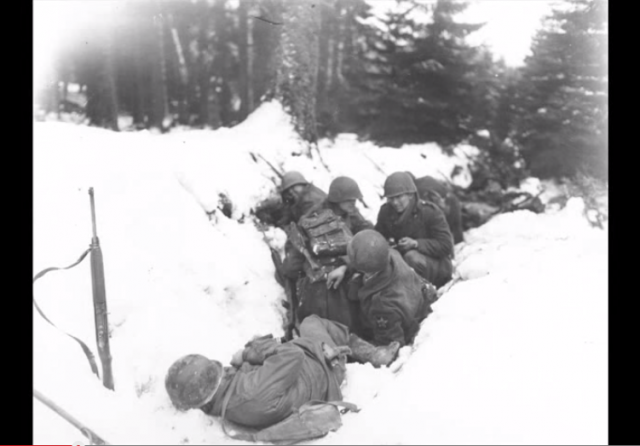
The Battle of the Bulge was a turning point in World War II, when American troops turned back the final Nazi counter-offensive on the Western front. Over 100,000 Americans would be killed or wounded before it was over.
The battle lasted for weeks, but came to a head over Christmas, 1944.
Christopher Miskimon at Warfare History Network has this account of one Christmas Eve battle.
On Christmas Eve, General Anthony McAuliffe sent a message to his soldiers, including news of the refusal of American troops to surrender in the surrounded town of Bastogne, better known as “NUTS!“:A Christmas Eve Tank Battle During the Battle of the Bulge: A few American tank crews held off attacking SS troops in a costly fight during the Battle of the Bulge.
The German Ardennes Offensive was in full swing during Christmas 1944. The 2nd SS Panzer Division was pressing its assault around the Belgian town of Manhay. Opposing them were the soldiers of the US 3rd Armored Division. The unit had sent Task Force Kane, a mixed force comprising Stuart and Sherman tanks along with artillery and engineer support, reinforced by paratroopers of the 82nd Airborne. This group took positions in the villages of Lamormenil and Freynaux. They spent December 23rd beating off attacks by German Volksgrenadiers. By the next day, the east side of Freynaux was protected by three Shermans and a pair of Stuart tanks along with 45 dug-in reconnaissance troops from the 83rd Recon Battalion. They sat on the west side of a stream meandering east of the village….
The short duel ended with a German retreat. Four Panthers and one Sherman littered the battlefield. While the Sherman was generally considered inferior to the Panther, the GIs had held through good tactics and solid defensive positions. Though it was not the last attack of the day, at dusk the Americans still held Freynaux. They stood up to the best the Nazis could throw at them; their duel on Christmas Eve was one step toward throwing the enemy back.
Gen. McAuliffe’s Christmas message to his soldiers, Battle of the Bulge, 70 years ago this week: pic.twitter.com/8q8wrnqSiI
— Michael Beschloss (@BeschlossDC) December 22, 2014
Troops in Bastogne would received relief the day after Christmas 1944.
Military Museum commemorates Battle of the Bulge 70th anniversary with veterans – http://t.co/rnzcvMoCLm pic.twitter.com/uODpCyL4VA
— War History Online (@WarHistoryOL) December 24, 2014
Here’s a pic of my grandfather a few months before The Battle of The Bulge: October ’44 in Paris. pic.twitter.com/Ps7CRcR8fH
— StevenBayShore (@StevenBayShore) December 24, 2014
Battle of the Bulge Survivor Dies Before The 70th Anniversary Of America’s Great Win – http://t.co/TBQQd2XQLS pic.twitter.com/TzMd5w7Rpn
— All The News (@AllTheNewscom) December 24, 2014
70th Annvsry: Battle of the Bulge: Lrgst battle evr fought by U.S. Army: http://t.co/JfOzc4XiPX. #history #USArmy pic.twitter.com/sJ22782Rf8
— R. E. Wilhelm III (@dutchmn007) December 23, 2014
When I first wrote about Christmas during the Battle of the Bulge in 2014, I linked the post at Legal Insurrection’s Facebook page.
It quickly received hundreds of shares and “likes,” and dozens of comments from people whose fathers or grandfathers fought in the Battle of the Bulge, including from Cherokee Genealogist Twila Barnes (whose research was critical to debunking Elizabeth Warren’s claim to be Cherokee):
A Facebook commenter also called my attention to a U.S. Army website with original photos, including this one:
Three members of an American patrol cross a snow covered Luxembourg field on a scouting mission. White bedsheets camouflage them in the snow. Left to right: Sgt. James Storey, Newman, Ga.; Pvt. Frank A. Fox, Wilmington, Del., and Cpl. Dennis Lavanoha, Harrisville, N.Y. (30 Dec 1944). Lellig, Luxembourg
Signal Corps Photo #ETO-HQ-45-5003 (Hustead)
Another Facebook commenter sent a link to a story about the restoration of Cobra King, the first tank to break through at Bastogne:
We also previously remembered Christmas in German POW camp Stalag Luft 1, particularly Lt. Elroy Frank Wyman from Maine, murdered by a German guard.
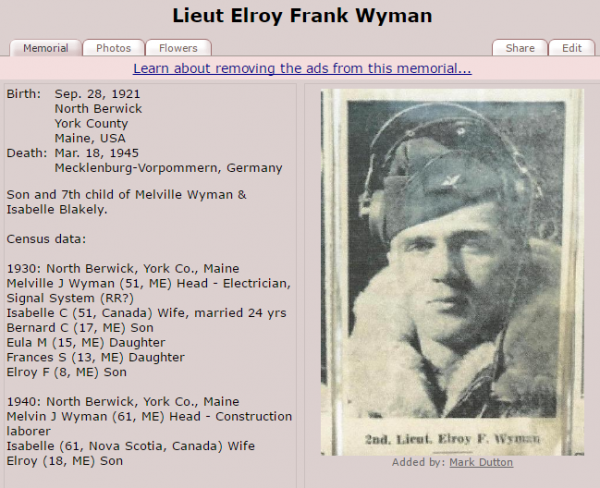
I also found a story that took place while American POWs captured during the Battle of the Bulge were marched to Germany. The story was told in 2011 by Keith Ginther of Montana, and was republished on his death in July 2014 by The Great Falls Tribune:
Quiet, dependable, faithful rancher Keith Ginther died Sunday in Choteau. His passing brought to mind this story, which we featured Christmas 2011. I had known him for many years in a vague sort of way. He never had much to say. And then at Christmas one year, he suddenly started talking. He seemed shocked later by all he’d reveled [sic] but proud to have told his story, too. — Kristen Inbody
Here’s an excerpt from his story (emphasis added):
In December 1944, Ginther became one of the 23,000 Americans captured or missing by the end of the Battle of the Bulge, Germany’s final and ultimately unsuccessful offensive on the Western Front.
He began a 150-mile march into Germany 67 years ago this month. He remembers feeling humbled in defeat, even more so as the POWs met German artillery pulled by horses or one truck pulling another on its way to the front….
The column of POWs passed through a countryside devastated by war and damaged by Allied bombing. At one village, the POWs had to clear rubble so German artillery could pass through. An American bomber pilot joined the prisoner ranks.
“The people seemed to be more hostile to airmen, whom they blamed for being bombed,” Ginther said.
Germans harassed the downed pilot. They’d rush the sides of the column, trying to grab him.
The villagers were starving, exhausted and angry.
When the hostility was at its worst, all the prisoners had reason to be afraid — though none so much as the captured bomber pilot.
Yet at that moment, an American in the ranks began singing “Silent Night.”
“Pretty soon the Germans were singing ‘Silent Night’ too, so it calmed things down,” Ginther said. “Halfway through the first verse, you could hear the German words, too.”
If not for the song, which for one moment brought a measure of peace to a one small corner of Germany, “I don’t really know what would have happened,” he said. “The guards would have tried, I guess, to protect him.”
Read the rest of Ginther’s memories at the link.
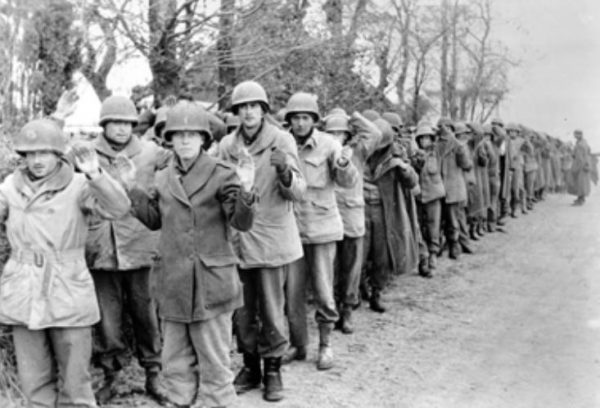
American prisoners of war are marched back into Germany after their capture during the Battle of the Bulge in the winter of 1944. [Army photo]
This post is a compilation from prior posts I’ve written over the years about Christmas during WWII:
- Christmas 1944: The Battle of the Bulge
- Christmas in German POW camp Stalag Luft 1
- Christmas Eve 1944: How singing ‘Silent Night’ saved American POWs during the Battle of the Bulge
- Christmas Eve in the Ardennes 1944
Donations tax deductible
to the full extent allowed by law.

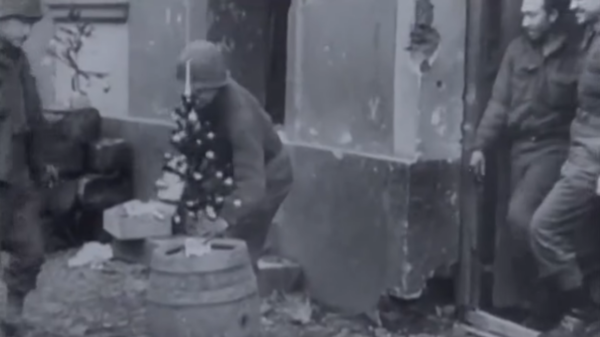
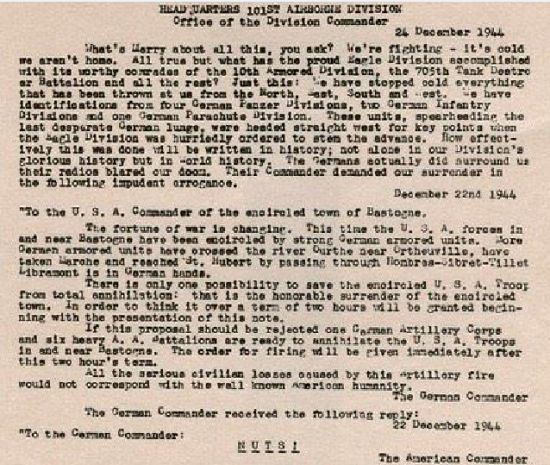
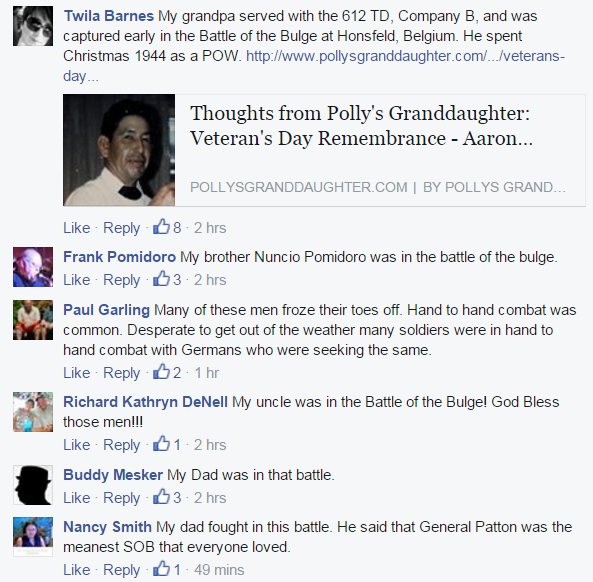
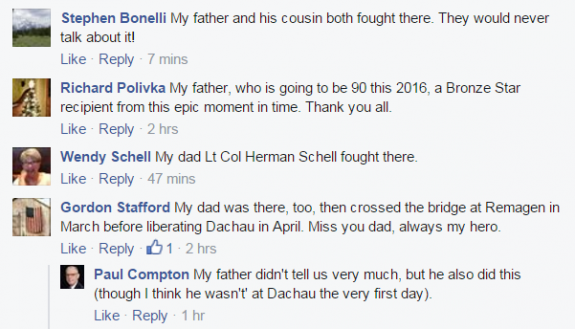
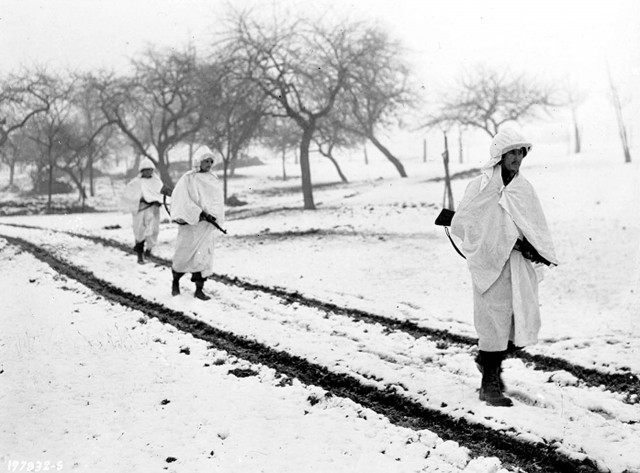
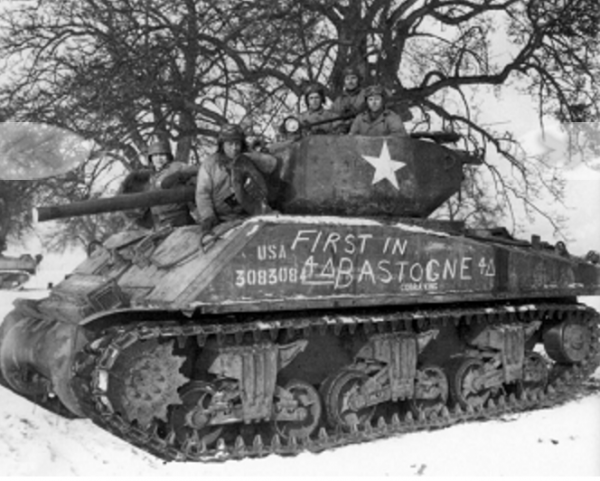







Comments
Stalingrad was the turning point
The Battle of the Bulge was the denouement for the European theater.
As an aside – Col Keith Goode was credited for finding the Cobra King in Germany. Keith is a great young man who graduated from Texas A&M.
https://en.wikipedia.org/wiki/Cobra_King_(tank)
https://nara.getarchive.net/media/chaplain-col-keith-n-goode-is-the-current-us-military-07c9da
https://www.westpoint.edu/about/chaplain
https://www.facebook.com/stripesmedia/posts/an-army-chaplain-keith-goode-began-to-suspect-an-anonymous-tank-on-display-in-vi/10156453217352316/
As an aside, Col Keith Goode was credited with finding the Cobra King while station in Germany. Keith is a great young man who graduated from Texas A&M. Presently, Chaplain at West Point. A good man all around!
“That year, army Chaplain Keith Goode became curious about the old tank on display near the back gate of the US Army’s Rose Barracks at Vilseck, Germany. After examining the tank, he came to believe it was actually the famous Cobra King.”
https://en.wikipedia.org/wiki/Cobra_King_(tank)
https://www.facebook.com/stripesmedia/posts/an-army-chaplain-keith-goode-began-to-suspect-an-anonymous-tank-on-display-in-vi/10156453217352316/
http://www.americainwwii.com/articles/cobra-king-today/
https://www.westpoint.edu/about/chaplain
https://nara.getarchive.net/media/chaplain-col-keith-n-goode-is-the-current-us-military-07c9da
If these soldiers could see ahead to today and see what they were fighting for, they’d walk home.
Knock it off. Those troops came home and built a golden age…. AFTER they won. The idea that they’d have stopped fighting the Nazis because we’re dealing with a bunch of woke idiots and authoritarian spendthrift politicians 76 years later is just dumb. They’d laugh at you.
Well, they’d probably raise their children differently. But, hell, so would anybody with the benefit of hindsight.
I wonder if America still produces men such as these? Up until two years ago, we had a neighbor who was in the D-Day landing as part of the Army’s ‘Old Hickory’ division. His group eventually kept to the edges of the woods along with all the anti tank gear they could carry. Their job was to attack a German Panzer with explosives and then run like hell back to the trees. He said many of the men returned with blood draining from their ears. He got all the way to the German border, along with those who survived, with nary a scratch. Twenty miles into Germany he caught shrapnel in his hip and later discovered a couple of cracked ribs.
Jack would talk to us about this part of his war service in Dec. 1944. Only if asked would he comment about what had become of America today, such as we are. He was clear minded right up to his last days.
had a father and two uncles that served in the war–though in different theatres and different branches, their experiences were essentially the same–they were all reluctant to discuss those times but the litany / benediction they each expressed was pretty much:
” we didn’t really think about tomorrow, we just did what had to be done. ”
may god bless them and keep them
TechnoFog has a great story from The Bulge
https://technofog.substack.com/p/christmas-eve-1944
My grandfather was there. Walked onto Omaha and kept going. The shear courage that took was and is breathtaking. My dad and myself have served in war but what by grandfather did takes my breath away
Bulge was a near total catastrophe resulting from a hasty decision to put green troops on the front line.